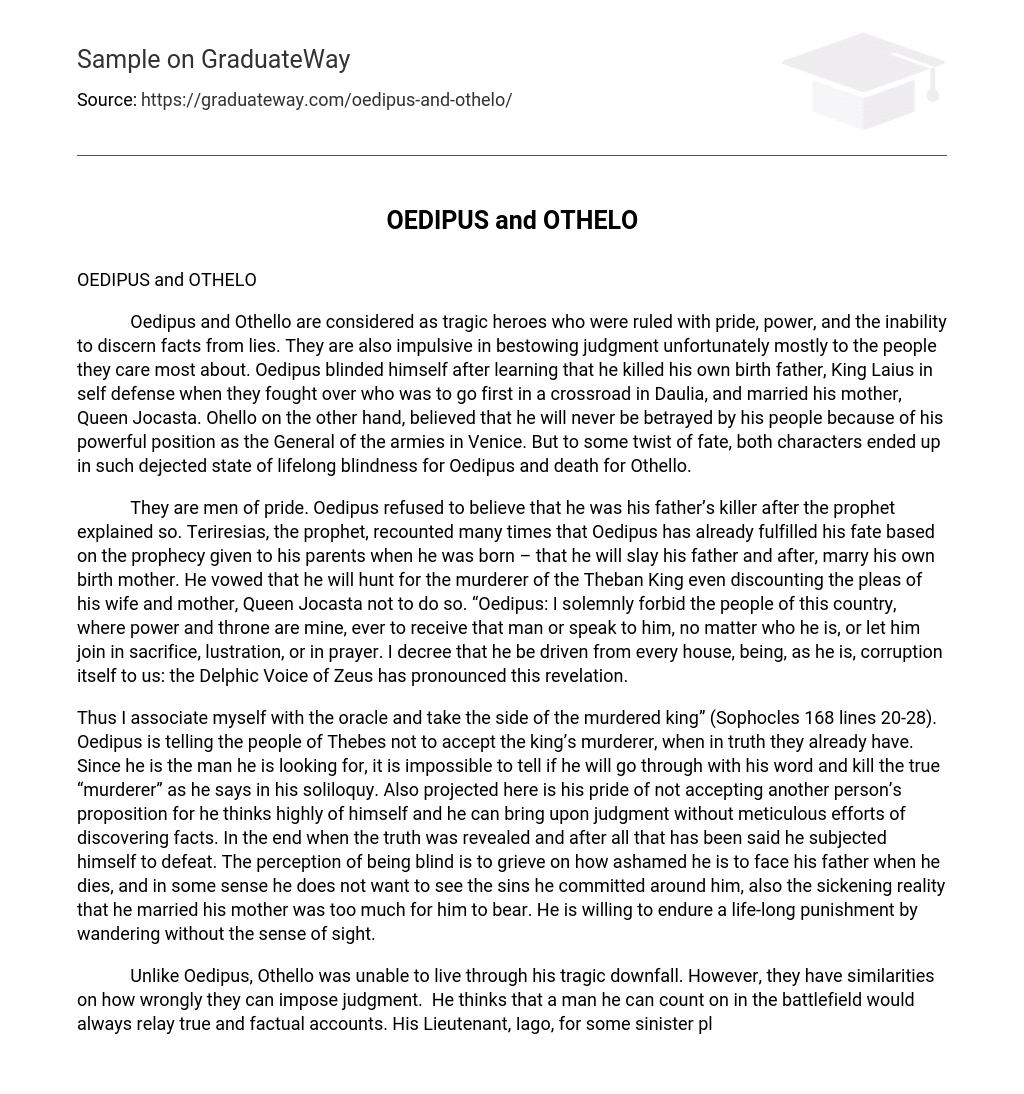Oedipus and Othello are considered as tragic heroes who were ruled with pride, power, and the inability to discern facts from lies. They are also impulsive in bestowing judgment unfortunately mostly to the people they care most about. Oedipus blinded himself after learning that he killed his own birth father, King Laius in self defense when they fought over who was to go first in a crossroad in Daulia, and married his mother, Queen Jocasta. Ohello on the other hand, believed that he will never be betrayed by his people because of his powerful position as the General of the armies in Venice. But to some twist of fate, both characters ended up in such dejected state of lifelong blindness for Oedipus and death for Othello.
They are men of pride. Oedipus refused to believe that he was his father’s killer after the prophet explained so. Teriresias, the prophet, recounted many times that Oedipus has already fulfilled his fate based on the prophecy given to his parents when he was born – that he will slay his father and after, marry his own birth mother. He vowed that he will hunt for the murderer of the Theban King even discounting the pleas of his wife and mother, Queen Jocasta not to do so. “Oedipus: I solemnly forbid the people of this country, where power and throne are mine, ever to receive that man or speak to him, no matter who he is, or let him join in sacrifice, lustration, or in prayer. I decree that he be driven from every house, being, as he is, corruption itself to us: the Delphic Voice of Zeus has pronounced this revelation.
Thus I associate myself with the oracle and take the side of the murdered king” (Sophocles 168 lines 20-28). Oedipus is telling the people of Thebes not to accept the king’s murderer, when in truth they already have. Since he is the man he is looking for, it is impossible to tell if he will go through with his word and kill the true “murderer” as he says in his soliloquy. Also projected here is his pride of not accepting another person’s proposition for he thinks highly of himself and he can bring upon judgment without meticulous efforts of discovering facts. In the end when the truth was revealed and after all that has been said he subjected himself to defeat. The perception of being blind is to grieve on how ashamed he is to face his father when he dies, and in some sense he does not want to see the sins he committed around him, also the sickening reality that he married his mother was too much for him to bear. He is willing to endure a life-long punishment by wandering without the sense of sight.
Unlike Oedipus, Othello was unable to live through his tragic downfall. However, they have similarities on how wrongly they can impose judgment. He thinks that a man he can count on in the battlefield would always relay true and factual accounts. His Lieutenant, Iago, for some sinister plot, begins to feed Othello with ideas that his wife is unfaithful to him. Although he did not believe these allegations at an onset but somehow it bore doubts in his mind since all these recounts came from one of his trusted men. Soon hatred took over him which drove him to kill his wife for the sins he believed she has committed. “Othello: Damn her, lewd minx! O, damn her! Come, go with me apart; I will withdraw. To furnish me with some swift means of death for the fair devil” (898 act 3 scene 3 lines 476-479) Because of the dreadful mixture of pride, jealousy, and power, Othello was put in a situation where he was defeated.
But even in the end, he would want the people to know that he killed his wife for his deep love for her and not because of the reality that he was merely overwhelmed with jealousy. On the lives of both men, pride is the ultimate motive for such reckless actions. Their impulsiveness originated from their lack of ability to investigate upon the accounts of the people around them. If only they did, they could have uncovered the truth without misfortune. But because of their stubborn nature, they both paid for it with their lives – Oedipus, living his remaining years in such miserable state of having to ponder on all his mistakes; and Othello, a quick death. It also showed how one can regret in the end when all the mistakes can no longer be rectified since the people they did so much injustice are already dead.





